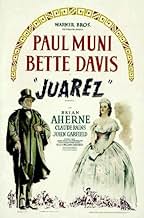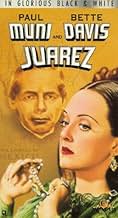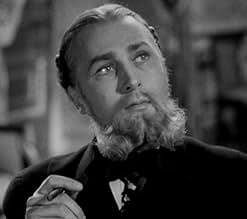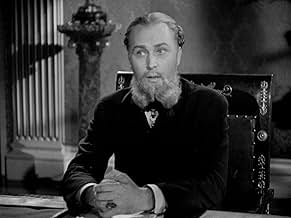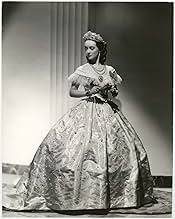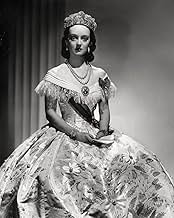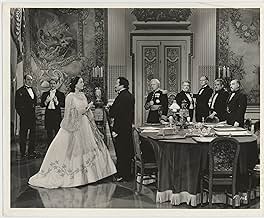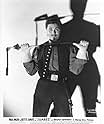Juarez
- 1939
- Tous publics
- 2h 5m
IMDb RATING
6.9/10
2.7K
YOUR RATING
Louis Napoleon III (Claude Rains) takes advantage of the American Civil War to circumvent the Monroe Doctrine and expand his power by helping Emperor Maximilian von Habsburg (Brian Aherne) t... Read allLouis Napoleon III (Claude Rains) takes advantage of the American Civil War to circumvent the Monroe Doctrine and expand his power by helping Emperor Maximilian von Habsburg (Brian Aherne) to add Mexico to his empire.Louis Napoleon III (Claude Rains) takes advantage of the American Civil War to circumvent the Monroe Doctrine and expand his power by helping Emperor Maximilian von Habsburg (Brian Aherne) to add Mexico to his empire.
- Nominated for 1 Oscar
- 3 wins & 1 nomination total
Featured reviews
Juarez is a film that might possibly have been better served if the concept of a mini-series had been available back in 1939. Certainly his story in its entirety with Maximilian and Carlotta as just one part of it would be a mini-series.
Benito Juarez who rose from being an illiterate Zapotec Indian from Oaxaca province in Mexico has developed into the Mexican statesman with the biggest popular appeal in American culture. Note how in the film, he is juxtaposed with Abraham Lincoln. Both men started from very humble background and rose to lead their respective nations at the same time, in times of great crises for their countries.
Paul Muni makes an impassive and stoic Juarez. It certainly is atypical of the rest of his historical characters be it Louis Pasteur, Pierre Radisson, or Emile Zola where he is quite eloquent. It's so different than what you normally see from Muni.
Juarez's story shares the screen with that of his counterpart the Emperor Maximilian. The real Maximilian was not as naive as Brian Aherne would have us believe. He knew very well his power was there while the French army was there. Yet in his own way with limited options he tried to govern as best he could. Aherne was nominated for Best Supporting Actor, but lost to Thomas Mitchell for Stagecoach.
Hollywood usually can't resist a mad act and Bette Davis might have been nominated herself had she not been already nominated for the much better Dark Victory. It really did happen that way, the high strung Carlotta just snapped when she returned to France to get help for her beleaguered husband. She lived in her private mad world for over 60 years, dying in the mid twenties of the next century.
Claude Rains registers well as emperor Louis Napoleon and with this film played both Bonaparte emperors of France. He had played the first Napoleon in Hearts Divided. Marshal Achille Bazaine played well by Donald Crisp was withdrawn with his troops because France was very concerned, rightly so, about a growing threat from a uniting Germany and couldn't waste time with imperialist ventures. I do love the fact that the French seem so concerned about the Monroe Doctrine which was nothing more than an expression of U.S. policy, always has and always will be. It had no force of law behind it, but with the Civil War over and the Union Army at the point of Appomattox being the largest army in the world at that time, that had more to do with Napoleon deciding that the western hemisphere wasn't worth it.
An interesting side note to that retrenchment policy, Louis Napoleon also withdrew French troops from Rome and the Papal States for the same reason at the same time because of threats to the home land. It removed the last block to a uniting Italy as well.
If I have a favorite among the supporting cast it is Joseph Calleia who plays Juarez's slippery Vice President who tries a palace coup d'etat and falls very short.
The one jarring note in the cast is John Garfield who sounds more like he's from the Lower East Side of New York than Mexican as Juarez supporter and future dictator of Mexico, Porfirio Diaz.
Juarez as a film is overly ambitious, it tries to tell too much in the running time allotted. A film about Juarez and a film strictly from the Maximilian/Carlotta point of view would have been far better.
Benito Juarez who rose from being an illiterate Zapotec Indian from Oaxaca province in Mexico has developed into the Mexican statesman with the biggest popular appeal in American culture. Note how in the film, he is juxtaposed with Abraham Lincoln. Both men started from very humble background and rose to lead their respective nations at the same time, in times of great crises for their countries.
Paul Muni makes an impassive and stoic Juarez. It certainly is atypical of the rest of his historical characters be it Louis Pasteur, Pierre Radisson, or Emile Zola where he is quite eloquent. It's so different than what you normally see from Muni.
Juarez's story shares the screen with that of his counterpart the Emperor Maximilian. The real Maximilian was not as naive as Brian Aherne would have us believe. He knew very well his power was there while the French army was there. Yet in his own way with limited options he tried to govern as best he could. Aherne was nominated for Best Supporting Actor, but lost to Thomas Mitchell for Stagecoach.
Hollywood usually can't resist a mad act and Bette Davis might have been nominated herself had she not been already nominated for the much better Dark Victory. It really did happen that way, the high strung Carlotta just snapped when she returned to France to get help for her beleaguered husband. She lived in her private mad world for over 60 years, dying in the mid twenties of the next century.
Claude Rains registers well as emperor Louis Napoleon and with this film played both Bonaparte emperors of France. He had played the first Napoleon in Hearts Divided. Marshal Achille Bazaine played well by Donald Crisp was withdrawn with his troops because France was very concerned, rightly so, about a growing threat from a uniting Germany and couldn't waste time with imperialist ventures. I do love the fact that the French seem so concerned about the Monroe Doctrine which was nothing more than an expression of U.S. policy, always has and always will be. It had no force of law behind it, but with the Civil War over and the Union Army at the point of Appomattox being the largest army in the world at that time, that had more to do with Napoleon deciding that the western hemisphere wasn't worth it.
An interesting side note to that retrenchment policy, Louis Napoleon also withdrew French troops from Rome and the Papal States for the same reason at the same time because of threats to the home land. It removed the last block to a uniting Italy as well.
If I have a favorite among the supporting cast it is Joseph Calleia who plays Juarez's slippery Vice President who tries a palace coup d'etat and falls very short.
The one jarring note in the cast is John Garfield who sounds more like he's from the Lower East Side of New York than Mexican as Juarez supporter and future dictator of Mexico, Porfirio Diaz.
Juarez as a film is overly ambitious, it tries to tell too much in the running time allotted. A film about Juarez and a film strictly from the Maximilian/Carlotta point of view would have been far better.
An amazing conflagration of actors populates the cast of 1939's "Juarez" -- Brian Aherne, Paul Muni, Bette Davis, Claude Rains, John Garfield, Gale Sondergaard, Donald Crisp, Gilbert Roland, and Louis Calhern. More amazing is the size of many of their roles - small! It shows that Warner Brothers put everything behind this epic film.
The story concerns the short reign of Maximilian von Hapsburg (Aherne) as Emperor of Mexico, seduced into taking the position by Napoleon III (Rains) who convinces him that the Mexican people want a monarchy. They don't. Opposing Maximilian is the man of the people, Benito Juarez (Muni), who has the support of the United States. Both Maximilian and Juarez want many of the same things, but Maximilian's hard work to unite the Mexican people and stop the fighting fails.
Though the title is "Juarez," the workhorse role belongs to the underrated Brian Aherne, an excellent actor from the theater who took second place to Errol Flynn at Warner Brothers. Though superstardom eluded him, he was a brilliant actor and a handsome man who turned in many great performances during a 43-year career. His Maximilian is gentle, likable, strong, and sympathetic. He gets third billing to Muni and Davis. Davis plays the Empress Carlota, Maximilian's wife. It's a secondary role but she has a huge, dramatic scene when Carlota returns to France to insist that Napoleon III keep his troops in Mexico. One of the best moments in the film is Carlota, going mad and believing the French court is trying to poison her, running out into the night, her white dress slowly disappearing. Davis wears magnificent gowns and has dark hair that seems to emphasize her huge eyes even more. She looks quite beautiful and gives a solid performance as a fragile woman devoted to her husband.
Paul Muni's Juarez is stiff, and he looks and acts as if he's embalmed. Muni was a great actor who delved deeply into his roles, and it's not clear what he was thinking when he gave this performance. Undoubtedly he had researched Benito Juarez to the ground and was giving an exact representation of him. But as Bette Davis once said, "True acting is larger than life." Muni needed something more for this role but doesn't supply it. John Garfield's Porfirio Diaz is odd casting. He makes a little attempt at an accent; underneath that dark makeup is still John Garfield. Supposedly his role was cut down. Back in 1939, audiences were just getting to know him, so his performance probably held up well back then. Nowadays one only thinks, "Why is John Garfield playing a Mexican?" "Juarez" is rich in detail - it occasionally is plodding and runs a bit long in an effort to supply the historic happenings. But it is well worth seeing for the performances, the story, and those Orry-Kelly gowns.
The story concerns the short reign of Maximilian von Hapsburg (Aherne) as Emperor of Mexico, seduced into taking the position by Napoleon III (Rains) who convinces him that the Mexican people want a monarchy. They don't. Opposing Maximilian is the man of the people, Benito Juarez (Muni), who has the support of the United States. Both Maximilian and Juarez want many of the same things, but Maximilian's hard work to unite the Mexican people and stop the fighting fails.
Though the title is "Juarez," the workhorse role belongs to the underrated Brian Aherne, an excellent actor from the theater who took second place to Errol Flynn at Warner Brothers. Though superstardom eluded him, he was a brilliant actor and a handsome man who turned in many great performances during a 43-year career. His Maximilian is gentle, likable, strong, and sympathetic. He gets third billing to Muni and Davis. Davis plays the Empress Carlota, Maximilian's wife. It's a secondary role but she has a huge, dramatic scene when Carlota returns to France to insist that Napoleon III keep his troops in Mexico. One of the best moments in the film is Carlota, going mad and believing the French court is trying to poison her, running out into the night, her white dress slowly disappearing. Davis wears magnificent gowns and has dark hair that seems to emphasize her huge eyes even more. She looks quite beautiful and gives a solid performance as a fragile woman devoted to her husband.
Paul Muni's Juarez is stiff, and he looks and acts as if he's embalmed. Muni was a great actor who delved deeply into his roles, and it's not clear what he was thinking when he gave this performance. Undoubtedly he had researched Benito Juarez to the ground and was giving an exact representation of him. But as Bette Davis once said, "True acting is larger than life." Muni needed something more for this role but doesn't supply it. John Garfield's Porfirio Diaz is odd casting. He makes a little attempt at an accent; underneath that dark makeup is still John Garfield. Supposedly his role was cut down. Back in 1939, audiences were just getting to know him, so his performance probably held up well back then. Nowadays one only thinks, "Why is John Garfield playing a Mexican?" "Juarez" is rich in detail - it occasionally is plodding and runs a bit long in an effort to supply the historic happenings. But it is well worth seeing for the performances, the story, and those Orry-Kelly gowns.
Brian Aherne, as the Emperor Maximillian, is the strongest thing going for this historical film depicting the failed attempt by Louis Napoleon to create a puppet government in Mexico. The rest of the casting is uneven at best. John Garfield is badly miscast as Diaz, as is that great character actor Donald Crisp. Paul Muni playing the Zapotac Indian, Benito Juarez, manages to just look stoic and sullen and is not called upon to do much acting. Maybe it's the makeup! Claude Rains and Gale Sondergaard are outstanding as Napoleon III and his queen Eugenie and they play at the devious political game with just the right amount of intrigue.
The film is historically correct and that is part of the problem. The filmmakers put every incident that led to the fall of Maximillian into the story and the film drags on and on. It's more information that we need to know.
There are mixed opinions on the Bette Davis portrayal of Empress Carlotta, the unstable wife of Maximillian. Hers is an interesting story but Davis may not have put enough incipient madness into her characterization.
On the whole,this is a pretty good history lesson with no Hollywood happy ending tacked on, that tells of a well meaning, gentle man who was badly used by the French emperor, sent to rule a people of whom he knew nothing, in a land where he was not wanted. And Aherne absolutely is perfect for the part.....he is the star of this film.
The film is historically correct and that is part of the problem. The filmmakers put every incident that led to the fall of Maximillian into the story and the film drags on and on. It's more information that we need to know.
There are mixed opinions on the Bette Davis portrayal of Empress Carlotta, the unstable wife of Maximillian. Hers is an interesting story but Davis may not have put enough incipient madness into her characterization.
On the whole,this is a pretty good history lesson with no Hollywood happy ending tacked on, that tells of a well meaning, gentle man who was badly used by the French emperor, sent to rule a people of whom he knew nothing, in a land where he was not wanted. And Aherne absolutely is perfect for the part.....he is the star of this film.
JUAREZ, despite playing fast and loose with certain historical facts, is nevertheless rousing and sumptuous epic film-making about the struggle for justice - on the one hand by the Mexican people and on the other by their hapless monarch.
The people are represented by Paul Muni impersonating Mexican president Benito Juarez; his expressionless face and slow, monotonous line readings are almost laughable; he comes across as a sort of Unconquerable Zombie of the People. He almost always appears in the same frame as a portrait of his hero and contemporary, Abraham Lincoln. As others have pointed out, his most powerful moment comes when he walks purposefully toward a line of armed soldiers in one of those moments of truth at the core of all successful revolutions: the refusal of the armed forces to defend the established regime.
The hounded monarch, Archduke Maximilian, is played by Brian Aherne in what may well be the best casting he was ever assigned on film. His performance is letter perfect as the idealistic puppet of Napoleon III who stuck to his outmoded principles despite overwhelming odds in much the same way as Nicholas II did in Russia decades later. In another parallel to the later Russian events, his domineering wife Carlotta (played by a beautifully photographed, no-holds-barred, black-bewigged Bette Davis) takes matters into her own hands to support his flimsy but ardent claim to the leadership of the country; Aherne, like Muni, is also frequently seen in proximity to a framed portrait - of his wife.
This is an expensive production with lavish costumes, stunning set pieces, gorgeous music, literate dialogue, a who's who of excellent supporting players, and breathtaking photography (the latter by veteran cameraman Tonio Gaudio, some of whose visions, especially Carlotta's prayer to the Virgin Mary and her final scene in a sunlit chamber, recall the most ethereal imagery of the silent era). All of these elements work together to get our blood surging in sympathy for the downtrodden Mexican peasantry as they rise up against cold hearted official corruption. And on a smaller level we feel equally moved by the personal plight of Maximilian.
With so much stuffing, not everything works perfectly. John Garfield, one of the best film actors of his time, is unconvincing as a Mexican general. There is a problem with pacing and informational overkill. Muni's sleepwalking performance contributes to a sense of sluggishness. Whenever he appears you brace yourself for a plodding and profound dose of Great Truth. At least these Truths are not banalities, so they are somewhat worth waiting for.
The people are represented by Paul Muni impersonating Mexican president Benito Juarez; his expressionless face and slow, monotonous line readings are almost laughable; he comes across as a sort of Unconquerable Zombie of the People. He almost always appears in the same frame as a portrait of his hero and contemporary, Abraham Lincoln. As others have pointed out, his most powerful moment comes when he walks purposefully toward a line of armed soldiers in one of those moments of truth at the core of all successful revolutions: the refusal of the armed forces to defend the established regime.
The hounded monarch, Archduke Maximilian, is played by Brian Aherne in what may well be the best casting he was ever assigned on film. His performance is letter perfect as the idealistic puppet of Napoleon III who stuck to his outmoded principles despite overwhelming odds in much the same way as Nicholas II did in Russia decades later. In another parallel to the later Russian events, his domineering wife Carlotta (played by a beautifully photographed, no-holds-barred, black-bewigged Bette Davis) takes matters into her own hands to support his flimsy but ardent claim to the leadership of the country; Aherne, like Muni, is also frequently seen in proximity to a framed portrait - of his wife.
This is an expensive production with lavish costumes, stunning set pieces, gorgeous music, literate dialogue, a who's who of excellent supporting players, and breathtaking photography (the latter by veteran cameraman Tonio Gaudio, some of whose visions, especially Carlotta's prayer to the Virgin Mary and her final scene in a sunlit chamber, recall the most ethereal imagery of the silent era). All of these elements work together to get our blood surging in sympathy for the downtrodden Mexican peasantry as they rise up against cold hearted official corruption. And on a smaller level we feel equally moved by the personal plight of Maximilian.
With so much stuffing, not everything works perfectly. John Garfield, one of the best film actors of his time, is unconvincing as a Mexican general. There is a problem with pacing and informational overkill. Muni's sleepwalking performance contributes to a sense of sluggishness. Whenever he appears you brace yourself for a plodding and profound dose of Great Truth. At least these Truths are not banalities, so they are somewhat worth waiting for.
Although there are some mistakes historically speaking,this is an absorbing screenplay,with superlative performances by Paul Muni,Bette Davis and Brian Aherne,who should have been at the top of the bill too,for he has more scenes than his two co-stars.
Muni is almost frightening with his impassive face and his slow delivery.If looks could kill,his certainly would...
Davis ,although she does not look like Charlotte physically ,gives a captivating portrayal of the empress.The scene when she prays Virgin Mary is impressive ,but not true: she was not sterile,but she and the emperor used to sleep apart!Their relationship was much more complex than the one depicted by Dieterlé: actually,the emperor was often away,it seemed that their strange love worked from a distance.Little by little,Maximilian lost all interest in power and Charlotte was ruling while he was gone (which often happened)or was staying in his Cuernavaca "paradise" .
Aherne is Maximilian in the flesh.It's interesting to notice that his brother Francis-Joseph had deprived him of all his rights and his titles in Austria.Historians generally agree that he would not have accepted the Mexican throne,if Charlotte had not been his wife. the problem is that the film doesn't show us the couple BEFORE they get to Mexico:one thing to bear in mind is that Max did not accept the throne overnight;and many people in Europa (notably Queen Victoria and Empress Elizabeth aka "Sissi" ) had warned them it was more a curse than a blessing.Charlotte (Carlotta) ,someone reportedly said ,wanted to reign over any people anywhere.Sissi called her Max's black angel. Maximilian is depicted as a chivalrous noble sovereign which he was in a way.But of course ,he had lots of (Mexican)lovers since he didn't sleep with his wife
Dieterlé does not pass over in silence the obnoxious role played by Napoleon the Third (and wife Eugénie de Montijo).Charlotte does show her contempt:"He is an impostor,his family is not an old one like ours ".The famous scene of the orangeade is included .Today,no serious historian would put forward that the drink was poisoned.But it might be possible that she was poisoned before leaving Mexico.Davis shines when she plays these scenes of madness.The scenes in Paris are not thoroughly accurate though:Eugenie (an incredibly beautiful Sondergaard) met first Carlotta alone in the Grand Hotel -they did not invite her to the Tuileries,which meant a lot about what they felt-Metternich was not the person who helped Carlotta :she first took refuge in the Vatican where the pope had trouble to get rid of her,then her sister-in-law Marie -Henriette ,queen of Belgium,came to her rescue when she was treated almost like a prisoner in Miramar.
All that concerns Maximilian's death is accurate ,his last words were "poor Charlotte!"
Poor Charlotte indeed.She was to outlive almost everyone,even Empress Eugenie! She died in 1927,after years and years of insanity with occasional moments of lucidity ,notably during WW1.
Dieterlé's movie is by no means uninteresting,but it would be exciting to film a remake in the light of the recent works about the Mexican adventure.
Muni is almost frightening with his impassive face and his slow delivery.If looks could kill,his certainly would...
Davis ,although she does not look like Charlotte physically ,gives a captivating portrayal of the empress.The scene when she prays Virgin Mary is impressive ,but not true: she was not sterile,but she and the emperor used to sleep apart!Their relationship was much more complex than the one depicted by Dieterlé: actually,the emperor was often away,it seemed that their strange love worked from a distance.Little by little,Maximilian lost all interest in power and Charlotte was ruling while he was gone (which often happened)or was staying in his Cuernavaca "paradise" .
Aherne is Maximilian in the flesh.It's interesting to notice that his brother Francis-Joseph had deprived him of all his rights and his titles in Austria.Historians generally agree that he would not have accepted the Mexican throne,if Charlotte had not been his wife. the problem is that the film doesn't show us the couple BEFORE they get to Mexico:one thing to bear in mind is that Max did not accept the throne overnight;and many people in Europa (notably Queen Victoria and Empress Elizabeth aka "Sissi" ) had warned them it was more a curse than a blessing.Charlotte (Carlotta) ,someone reportedly said ,wanted to reign over any people anywhere.Sissi called her Max's black angel. Maximilian is depicted as a chivalrous noble sovereign which he was in a way.But of course ,he had lots of (Mexican)lovers since he didn't sleep with his wife
Dieterlé does not pass over in silence the obnoxious role played by Napoleon the Third (and wife Eugénie de Montijo).Charlotte does show her contempt:"He is an impostor,his family is not an old one like ours ".The famous scene of the orangeade is included .Today,no serious historian would put forward that the drink was poisoned.But it might be possible that she was poisoned before leaving Mexico.Davis shines when she plays these scenes of madness.The scenes in Paris are not thoroughly accurate though:Eugenie (an incredibly beautiful Sondergaard) met first Carlotta alone in the Grand Hotel -they did not invite her to the Tuileries,which meant a lot about what they felt-Metternich was not the person who helped Carlotta :she first took refuge in the Vatican where the pope had trouble to get rid of her,then her sister-in-law Marie -Henriette ,queen of Belgium,came to her rescue when she was treated almost like a prisoner in Miramar.
All that concerns Maximilian's death is accurate ,his last words were "poor Charlotte!"
Poor Charlotte indeed.She was to outlive almost everyone,even Empress Eugenie! She died in 1927,after years and years of insanity with occasional moments of lucidity ,notably during WW1.
Dieterlé's movie is by no means uninteresting,but it would be exciting to film a remake in the light of the recent works about the Mexican adventure.
Did you know
- TriviaBecause the film shows a number of Maximilian's generals to be Mexican, many viewers attribute it to typical Hollywood historical distortions. It is, however, indeed accurate. It's a little-known fact that, although Maximilian was eventually overthrown and executed by Mexican revolutionaries, there were more Mexicans fighting on Maximilian's side than against him. This was due in large part to the Catholic Church's strong support of the French occupation of Mexico and its encouraging of Mexican Catholics to fight against the revolutionary forces by joining Maximilian's army, which they did in large numbers.
- GoofsWhen Napoleon III is informed in a letter that Robert E. Lee has been defeated at Gettysburg, he responds by paraphrasing Lincoln's famous Gettysburg Address by calling democracy as government for the people, by the people, etc. He couldn't have known Lincoln's speech flourish because it wasn't given until November 19, 1863, more than four months after the battle.
- Quotes
Emperor Louis Napoleon III: Democracy! Government of the cattle, by the cattle, for the cattle!
- Alternate versionsIn 1952, the film was re-released and several key scenes were removed, particularly sequences that contained dialogue that criticized countries which, in 1939 had been regarded as totalitarian, but which, by the early 1950s had become Cold War allies of the United States and could therefore no longer be criticized as imperialist adventurers. Germany and Italy, especially, former enemies in the 1940s, were now the cornerstone of NATO. The removal of these scenes obfuscated the narrative considerably, in particular, removing any clear reasons behind the execution of the Emperor Maximilian at the conclusion of the film. This revised print runs 106 minutes and is the version released on video and generally available today. The 1939 version is preserved on nitrate stock in the Warner Archive.
- ConnectionsFeatured in Hollywood and the Stars: The Angry Screen (1964)
- SoundtracksMy Country Tis of Thee
(uncredited)
Music attributed to Henry Carey (1744)
Played as part of the score when America is mentioned
- How long is Juarez?Powered by Alexa
Details
- Release date
- Country of origin
- Languages
- Also known as
- Maximilian and Carlotta
- Filming locations
- Warner Ranch, Calabasas, California, USA(Photographs)
- Production company
- See more company credits at IMDbPro
- Runtime2 hours 5 minutes
- Color
- Sound mix
- Aspect ratio
- 1.37 : 1
Contribute to this page
Suggest an edit or add missing content



